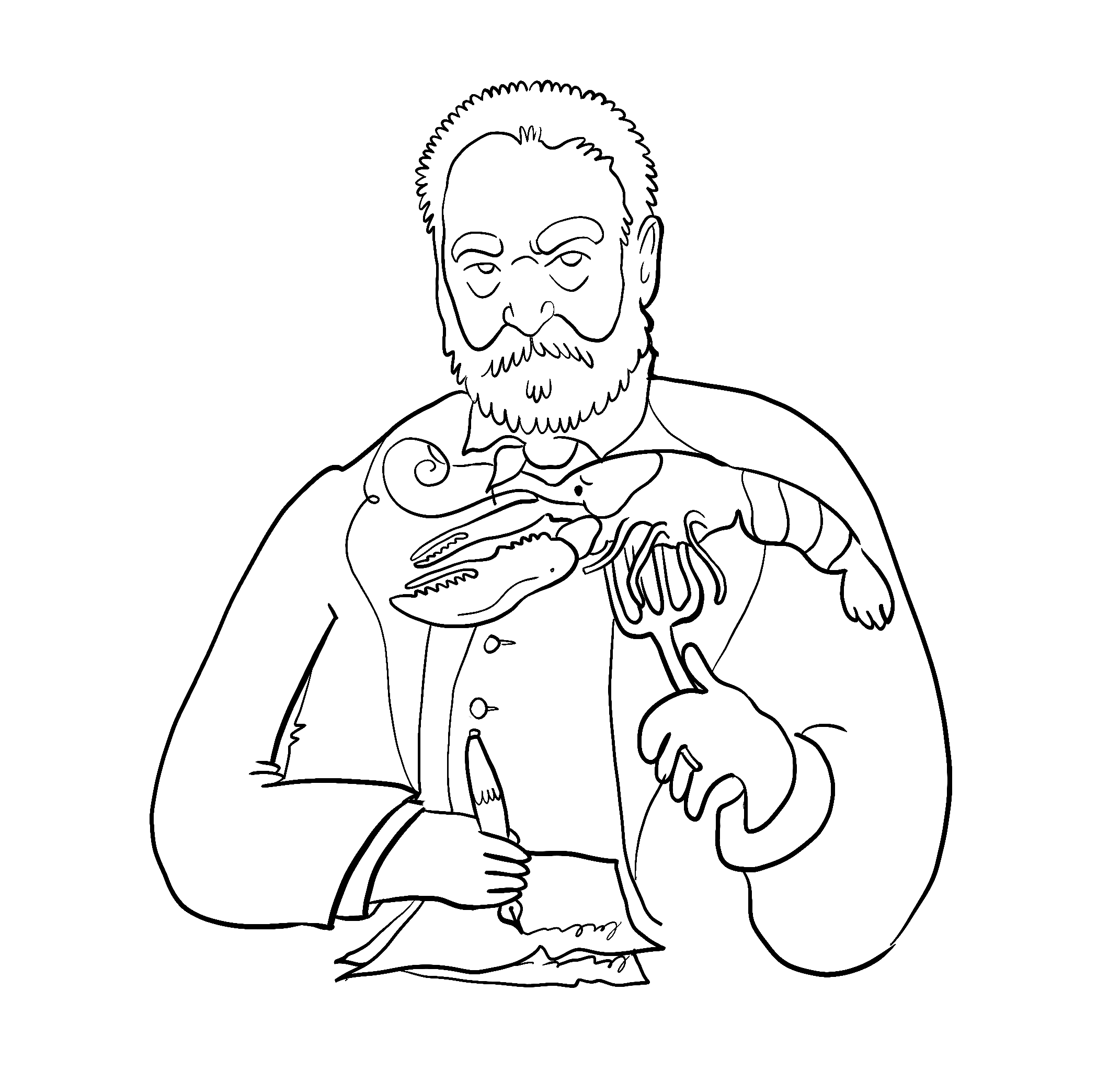Victor Hugo, who ate lobsters in their shells (and also wrote “Les Miserables”)
September 20, 2024
 Celeste Mercier
Celeste MercierUnpopular opinion: We’re too hard on France. I know, I know, what could those baguette-loving, mustache-having colonizers offer us super cool Americans? The answer to that question is the contributions of one Victor Marie Hugo. Of all the mad lads in history, Hugo was perhaps one of the maddest … and it’s hard to find other singular words to describe him. Brilliant? Sure. Revolutionary? Hell yes. Problematic? Of course. But there’s not much that can be briefly said about Hugo until you really start diving into his (impressively extensive) lore.
In his youth, Hugo would climb buildings and observe the layouts of streets. Then, he would saunter home and draw a detailed map of what he had seen. He created thousands of drawings and paintings but also found time to hold seats in the French Assembly and Senate. He was a loving father and grandfather. He was defined by excess in every way, writing 17 volumes of poetry, 11 works of prose fiction, one political manifesto, more than 40 other published works and at least 15 other unfinished works. And, yes, he was quite (read: absurdly) promiscuous. He lived with a true wife and an unofficial wife but had relationships with dozens of other women. And don’t even get me started on the prostitutes. When Hugo finally died at the impressive age of 83, the entire prostitution scene of Paris shut down for the day because so many wanted to join his funeral procession (which was followed by 2.2 million people, more than the population of Paris.)
Anyone who’s cried through “Les Miserables” knows that economic conditions for women in 19th-century France were bad. Hugo wrote 200 pages about how awful it was that decent women who couldn’t find work were forced into prostitution to prevent their children from starving. The fact that Hugo hired an outrageous number of prostitutes himself, despite his awareness of this social crisis, is not a point in his favor. Neither are his female portrayals in “Les Mis” and his other books. None of his female characters are strong—and when they do stand up, it’s always for a man. Cosette is vapid, naive and childish, and Esmeralda (from “Hunchback of Notre Dame”) has basically no agency and no ability to reclaim it. “Hunchback” is full of slurs and stereotypes about the Roma, yet a main idea is the harmful nature of violence against those who are different. It’s all pretty contradictory, sure, but the point is not to decide whether Hugo is “good” or “bad” or whether to accept or reject him from some historical hall of fame, but to reveal a full picture of him—giving the bad stuff its own space but leaving plenty of room for everything else.
So what did Hugo actually do, besides having unique lobster-eating habits? (He reportedly had an unstoppable appetite and would eat anything, including shellfish, whole.) Well, for the first few years of his life, the surprising answer is … be a really snooty royalist aristocrat. His dad was Napoleon’s biggest fan, and his mom was the lover of one of the spies who led to Napoleon’s great downfall. As you can imagine, that was the divorce of the century. Little Victor was raised by his royalist mom, and upon finding himself rich but unemployed, he decided to found a literary magazine at the age of seventeen. He spent his twenties writing poetry until he eventually realized that poor people actually deserve rights. He started writing about the injustice of the French prison system and wrote a satire mocking King Charles X. When Charles was replaced by a constitutional monarchy in 1830, Victor rejoiced, but the celebration ended when King Louis-Philippe ended up being pretty “mid” at equally representing the interests of all Frenchmen. Things got worse when Napoleon III took over in 1848, and Hugo actually got exiled to England—where he spent his time draping himself aesthetically over rocks, thinking about democracy and writing some of his greatest literary works. When he returned to France in 1870, he was hailed as a hero all across Europe, a veneration that continued until his death in 1883.
Hugo saved French poetry from obscurity and invented French romanticism. He transformed a failed revolution that would have definitely been forgotten—the June 1832 uprising around which “Les Mis” is based—into an integral part of literary history. His ideas about the spiritual world inspired the foundation of a Vietnamese séance cult (look it up, I don’t have the word count for this). He is beloved by figures as diverse as Stalin, Ayn Rand and local theater kids. So, what do you think—was Hugo the ultimate mad lad or just a loony old graphomaniac with a cult following? Before you make a decision, make sure to do even more Hugo research. It’s no wonder they called him Ocean Man—this guy’s got depth.

Comments
Before submitting a comment, please review our comment policy. Some key points from the policy: